Joshua Wong convicted for democracy protests in Hong Kong
Student activist vows to continue his campaign against Beijing – but fears for future political fight
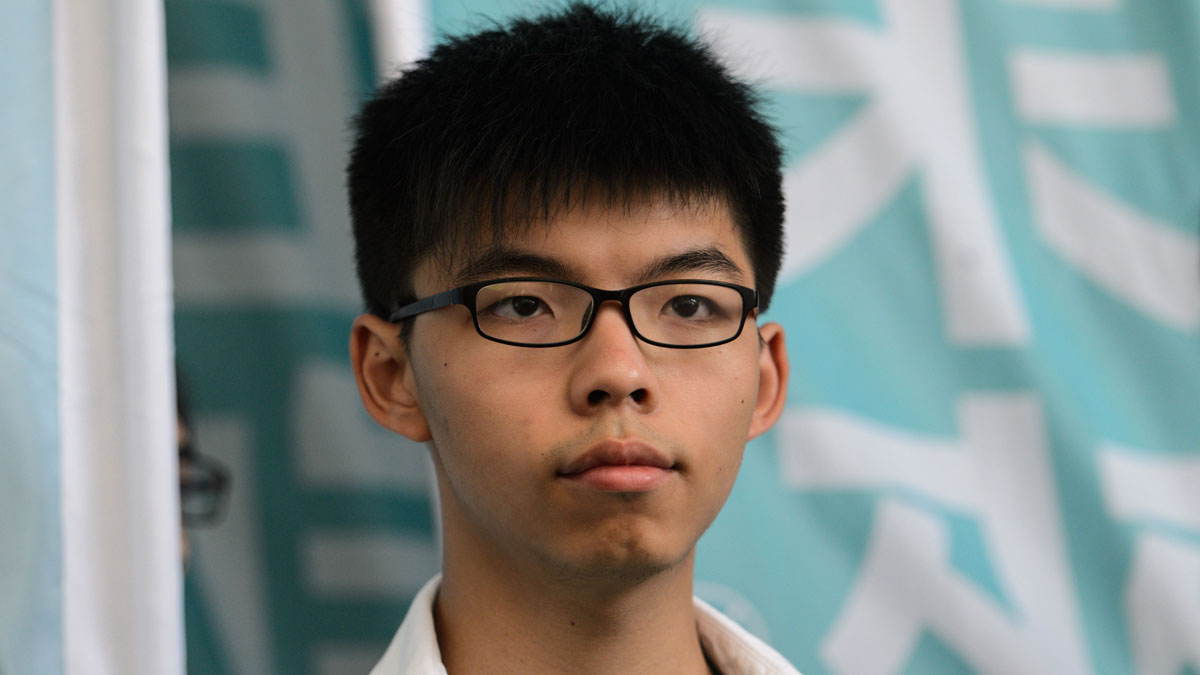
A free daily email with the biggest news stories of the day – and the best features from TheWeek.com
You are now subscribed
Your newsletter sign-up was successful
Teenage activist Joshua Wong was today found guilty by a Hong Kong court of participating in unlawful assembly.
The charges relate to the Umbrella Revolution of September 2014, which brought more than one million people to the city's streets.
The Week
Escape your echo chamber. Get the facts behind the news, plus analysis from multiple perspectives.

Sign up for The Week's Free Newsletters
From our morning news briefing to a weekly Good News Newsletter, get the best of The Week delivered directly to your inbox.
From our morning news briefing to a weekly Good News Newsletter, get the best of The Week delivered directly to your inbox.
He is not the only one facing action - Nathan Law, who is 23 and chairs the Demosisto party that Wong helped found in April, faced the same charges, but was also found guilty of inciting others to participate in the occupation, which lasted for three months.
Fellow pro-democracy activist Alex Chow was also found guilty of both charges.
Now Wong fears Law will not be able to run in the upcoming Legislative Council elections - and he is the only Demosisto candidate.
Speaking to TheWeek.co.uk after being released on bail, the student activist voiced his concerns that the pending sentencing hearing could severely hamper the movement's efforts to infiltrate mainstream politics in Hong Kong.
A free daily email with the biggest news stories of the day – and the best features from TheWeek.com
At 19, Wong is too young to stand for a seat in September's vote, despite having appealed to lower the age of candidacy. However, Law is set to stand.
All three men have been released on bail but are due to be sentenced on 15 August. A custodial sentence would all but remove Demosisto's chances of securing a seat on the council.
"We are just afraid because Nathan was found guilty of inciting unauthorised assembly and he is the only candidate of Demosisto," Wong said.
"If the court finally sends him to prison for more than three months, he will be cancelled out as a candidate. This is the challenge that we face.
"We are consulting the lawyers about this. We will plan for the best and the worst. We hope that Nathan can run in the election."
Wong is not afraid of going to prison as he believes it could bring more attention to the pro-democracy movement.
"I hope for the best, but I prepare for the worst. I am not really nervous. I just hope to prove the suppression from the Hong Kong government and to trigger more reaction from people around the world, and also [to persuade] people in Hong Kong to care about human rights conditions, democracy movements and my city," he says.
Nor does he rule out the possibility of further protests, saying that the sentencing could "make more people angry". He says the movement is more focused on installing a new generation in the corridors of power.
Wong sprung to fame in 2011 when he established the Scholarism movement, aged 14. The group opposed Beijing's perceived influence in the Hong Kong education system and brought more than 100,000 people to the streets in a protest the following year.
He has since become synonymous with Hong Kong's pro-democracy campaign, which opposes Beijing's pre-vetting of candidates for next year's leadership election. He was voted Time magazine's Young Person of the Year in 2014 and listed as one of the world’s greatest leaders by Fortune last year.
Umbrella movement: Protests in Hong Kong as senior Beijing official visits
18 May
Police appeared to outnumber protesters on the streets of Hong Kong today as 8,000 officers were deployed to stifle demonstrations over the three-day visit of Zhang Dejiang, the third-ranked official in the Chinese Communist Party and the person with ultimate reponsibility for Hong Kong affairs.
Bemused onlookers watched paving stones being glued to the ground, as the government sought to avoid a repeat of the 'Fishball Revolution' in February, when protesters threw bricks at the police, who responded by firing live rounds.
There was an ad hoc police campsite perched on Lion Rock, a mountain to the north of the city, to ensure protesters didn't unfurl any dissenting banners. Demonstrators did manage to place a banner reading "End Communist Party rule" on a bridge linking Hong Kong Airport to the rest of the city, resulting in four arrests, including the League of Social Democrats' chairman Avery Ng.
Zhang was in town to speak at a summit on China's ambitious 'One Belt One Road' plans, which will see billions of dollars of infrastructure rolled out along the ancient Silk Road route.
Hong Kong's pro-democracy movement has maintained its vocal opposition to Beijing's 2014 announcement that only a list of pre-vetted candidates would be approved for next year's chief executive elections.
A number of high-profile pro-democracy figures attempted to enter Zhang's hotel yesterday, after which the internet was awash with rumours that protesters would raid the Hong Kong Conference and Exhibition Centre (HKCEC).
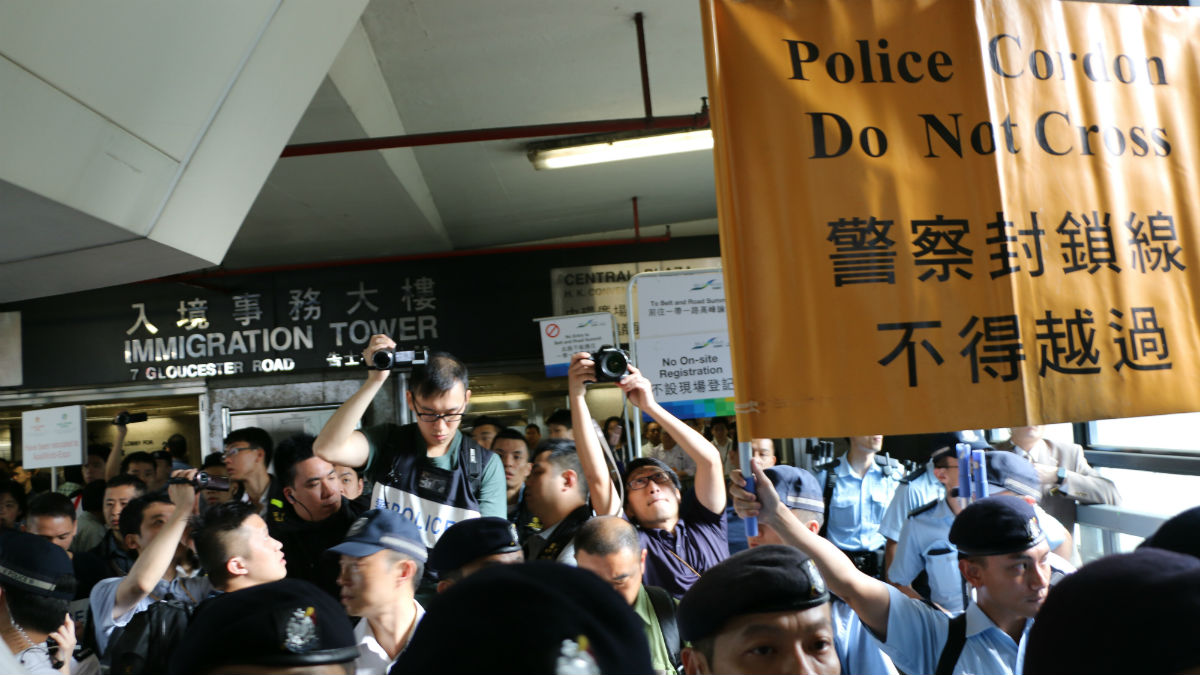
The main protest today consisted of around 200 campaigners representing the broad spectrum of groups under Hong Kong's 'Umbrella Movement'. The small group marched on the HKCEC, where they faced down the police, before moving noisily to a designated protest area a stone's throw from the venue.
A smaller pro-Beijing protest jeered the pro-democracy group. "I am 100% sure that those supporters are paid by the Chinese government," said Veronica Wong, a Shenzhen resident who came over the border to oppose Zhang's visit.
Ma Wan Ki, a campaigner at the League of Social Democrats, told TheWeek.co.uk that the group was keen to exercise a right not available to many of their peers in the mainland. "It's a very rare chance. Hong Kong [is the] only place people can give their demands. In China people will get arrested or killed," he said.
Liu Sze Ming of the Civil Human Rights Front had a letter for Zhang, whom he hoped would come to accept it. "The government wants to use Hong Kong resources on One Belt One Road, but that is Chinese policy. Hong Kong doesn't have the resources," he said.
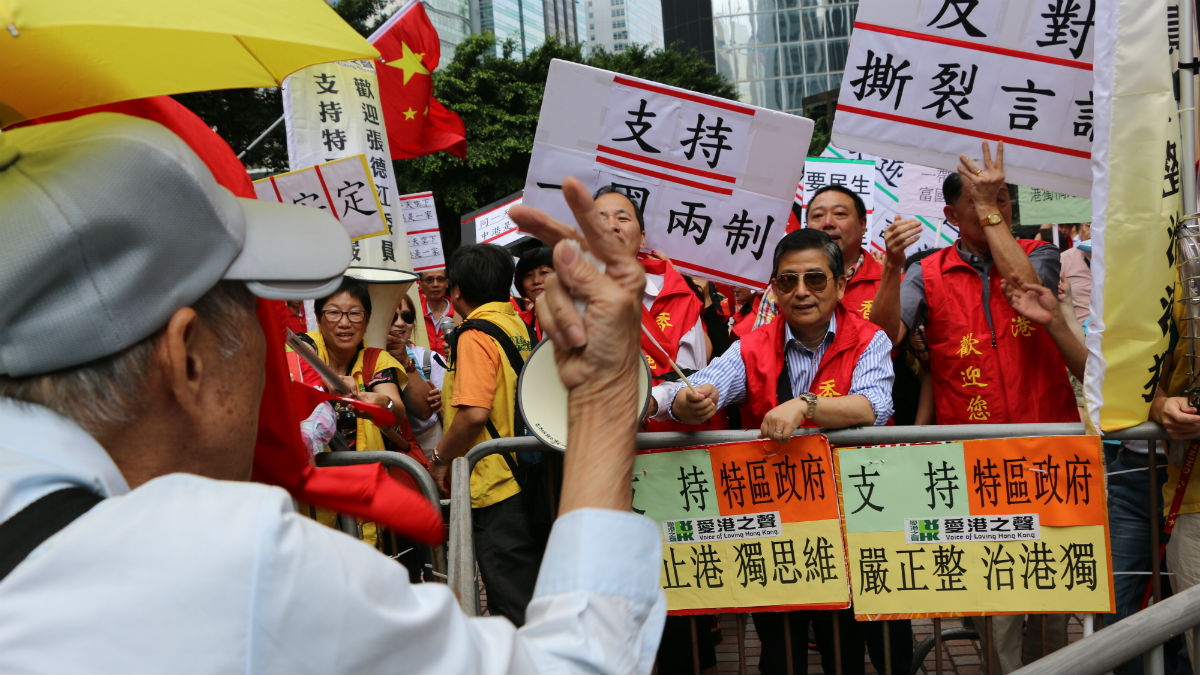
Others came to vent frustrations that go back years: Zhang was the leader of Guangdong province in Southern China during the Sars outbreak of 2003 that claimed more than 700 lives. Protester Loui Yuk Lin claims Zhang is to blame, saying he withheld information that could have saved lives.
She made a singlehanded attempt to rush the huge temporary barricade, releasing a bagful of yellow tickets into the air before being led away by police. By Hong Kong's standards, this was a sedate affair, although there were reports of scuffles between rival protest groups later in the day.
Zhang said yesterday that he came "with the care and love of the central government and all people in the country for Hong Kong."
But his words "did little to assuage the dissatisfaction and mistrust" of many Hong Kong citizens, says CNN.
'Fishball revolution': Hong Kong comes to terms with brutal New Year street battle
11 February
On the third day of the Chinese New Year celebrations, the streets of Mong Kok in Hong Kong are alive with impromptu karaoke sets, caricature sketchers and thousands of shoppers, picking through the selfie sticks and knock-off handbags that sit on makeshift market stalls. Spirits are high. The blood has long since been scrubbed from the roads and pavements.
You would scarcely believe that two nights ago, this was the scene of a street battle between protestors and police.
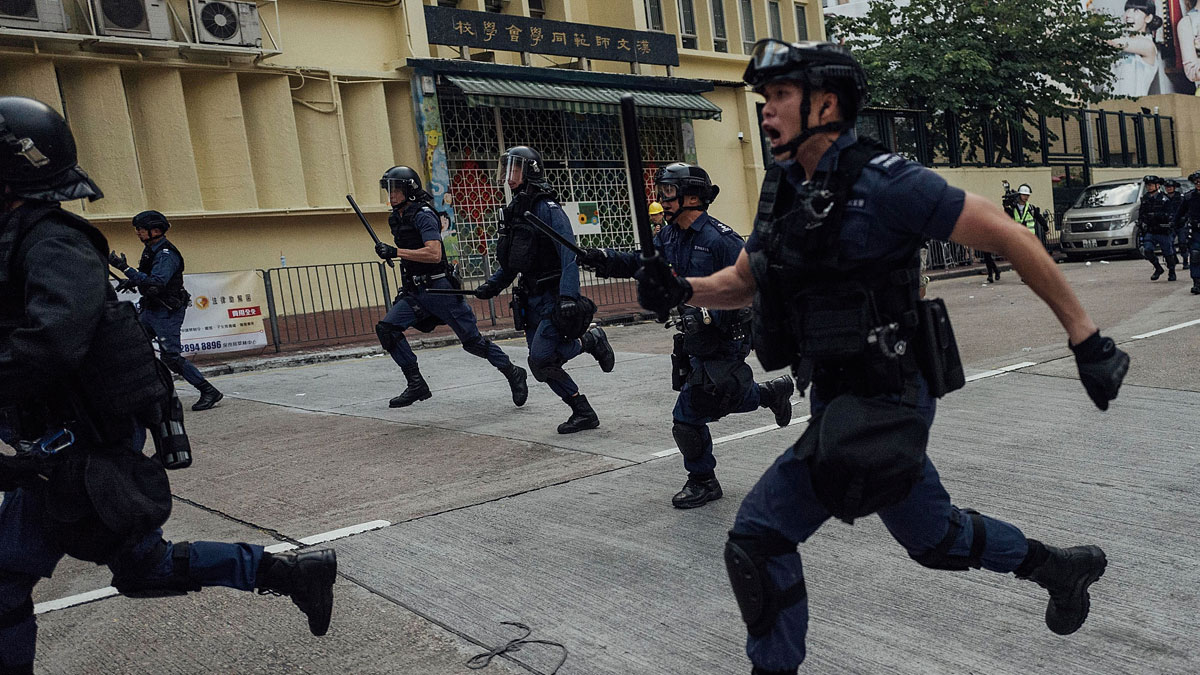
What caused the violence?
Trouble erupted after police tried to clear a market of unlicensed hawkers who were selling fishballs, a traditional Hong Kong street food. More than 100 protestors calling themselves "localists" got wind of the police's intentions and organised an opposition rally. Live shots were fired, a fact many Hong Kongers find inconceivable. This is a city that prides itself on a long history of peaceful protest. Rubbish bins were set alight and the police were pelted with rocks.
How serious was the rioting?
Dozens of police, protestors and journalists were injured. Sixty-one have since been arrested, according to the Hong Kong Police Force, which said they cleared the hawkers due to safety concerns.
"It's crazy, I've never seen it before in Hong Kong," a local shop owner named Ken told TheWeek.co.uk, in the doorway of his sunglasses store, next to the scene of the trouble.
The riot marked the latest – and bloodiest – flashpoint in Hong Kong's recent turbulent political history.
"I had never thought that armed police would come and evacuate the stalls at night. The [Chinese New Year] night market is an important part of our local culture," said Baggio Leung, the leader of Youngspiration, a political party which has its roots in the Umbrella Revolution of 2014.
"Localism" – and with it, anti-mainland sentiment – is on the rise in Hong Kong, with many suspicious of Beijing's perceived efforts to influence the media, as well as the education and political systems.
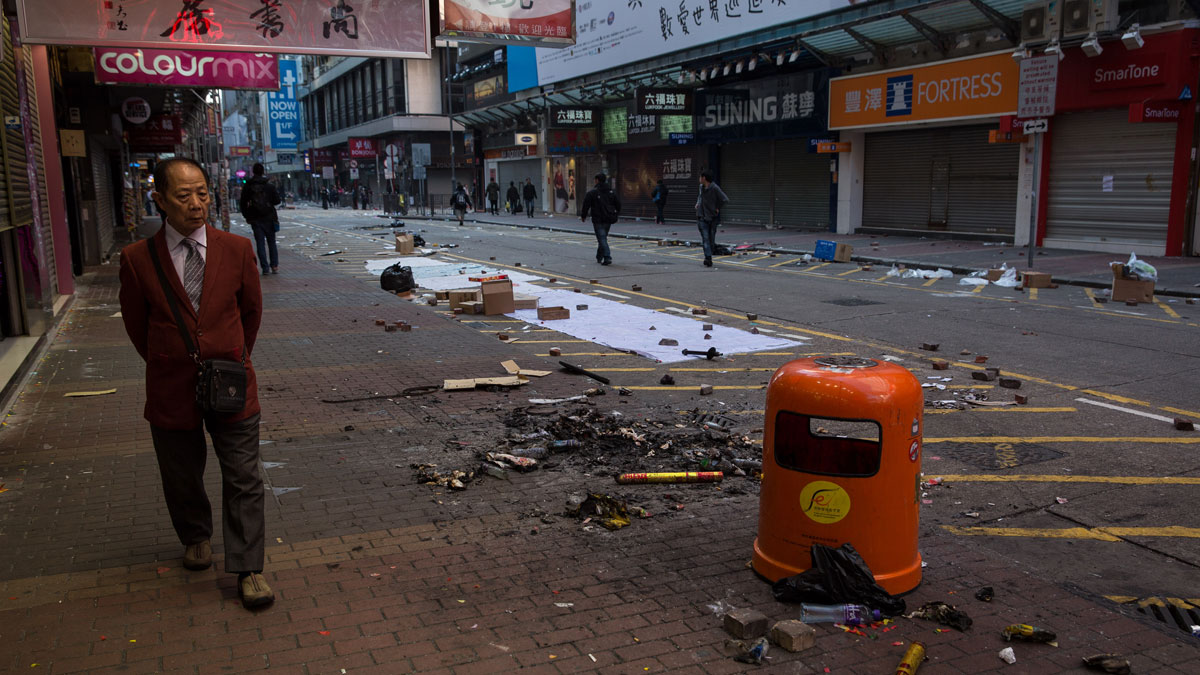
What is the significance of the gunfire?
Speaking by phone from the police headquarters in Wan Chai, where one of his activists is being held after being arrested at the airport, Joshua Wong, the face of Hong Kong's pro-democracy movement, doesn't mince his words.
"The last time [the police] used guns was in 1989, in Tiananmen Square. This is the turning point. Before the police used guns, there was nobody burning things or throwing bricks," he says.
Wong and some of his peers will go on trial this month for their part in the Umbrella Revolution of 2014, which saw thousands of protestors stage sit-ins in the city's business area. February will also see elections for the Legislative Council. The timing of the latest clash is inauspicious, to say the least.
In some quarters, anger towards the government has reached its peak. There is bewilderment towards the heavy-handedness of the police, while others bemoan the "thuggish" tactics of the protestors.
In Mong Kok's night markets, however, a carnival atmosphere pervades. Singing and dancing greets the sunset as Hong Kong welcomes the Year of the Monkey.
-
 What is the endgame in the DHS shutdown?
What is the endgame in the DHS shutdown?Today’s Big Question Democrats want to rein in ICE’s immigration crackdown
-
 ‘Poor time management isn’t just an inconvenience’
‘Poor time management isn’t just an inconvenience’Instant Opinion Opinion, comment and editorials of the day
-
 Bad Bunny’s Super Bowl: A win for unity
Bad Bunny’s Super Bowl: A win for unityFeature The global superstar's halftime show was a celebration for everyone to enjoy
-
 Epstein files topple law CEO, roil UK government
Epstein files topple law CEO, roil UK governmentSpeed Read Peter Mandelson, Britain’s former ambassador to the US, is caught up in the scandal
-
 Iran and US prepare to meet after skirmishes
Iran and US prepare to meet after skirmishesSpeed Read The incident comes amid heightened tensions in the Middle East
-
 Israel retrieves final hostage’s body from Gaza
Israel retrieves final hostage’s body from GazaSpeed Read The 24-year-old police officer was killed during the initial Hamas attack
-
 China’s Xi targets top general in growing purge
China’s Xi targets top general in growing purgeSpeed Read Zhang Youxia is being investigated over ‘grave violations’ of the law
-
 Panama and Canada are negotiating over a crucial copper mine
Panama and Canada are negotiating over a crucial copper mineIn the Spotlight Panama is set to make a final decision on the mine this summer
-
 Why Greenland’s natural resources are nearly impossible to mine
Why Greenland’s natural resources are nearly impossible to mineThe Explainer The country’s natural landscape makes the task extremely difficult
-
 Iran cuts internet as protests escalate
Iran cuts internet as protests escalateSpeed Reada Government buildings across the country have been set on fire
-
 US nabs ‘shadow’ tanker claimed by Russia
US nabs ‘shadow’ tanker claimed by RussiaSpeed Read The ship was one of two vessels seized by the US military